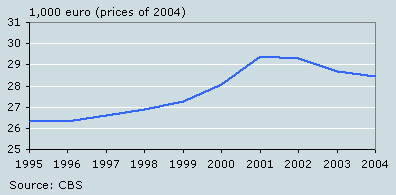Disposable income down again in 2004

The average disposable income of Dutch households amounted to 28.5 thousand euro in 2004. This is 0.7 percent less than in 2003. In 2001 tax reforms resulted in a substantial increase in disposable income. Since then disposable income has fallen annually. After correction for inflation, income in 2004 is still 1.5 percent higher than in 2000.
Income falls three years in a row
A long period of rising household income came to end in 2001. The increase in disposable household income of 4.7 percent in 2001 was mainly the result of tax reforms introduced in that year. After 2001 average disposable income fell for three years in a row. In 2004 it was 1.5 percent higher than four years previously.
Average disposable household income, corrected for inflation

Households with wage or pension relatively well off
Incomes of households receiving employee wages rose by 7.1 percent on average in 2001, but fell slightly in subsequent years. After correction for inflation the income of these households was 5.9 percent higher in 2004 than in 2000. Households with income from a pension were also relatively well off. Their income rose in all four years as a result of tax measures such as deductions for the elderly, but also because an increasing number of older people also receive a supplementary pension.
Self-employed and benefit claimants worse off
The income of self-employed people fell by most. In 2002 and 2003 the average income in this category fell by 10 percent. The average income of people claiming social security benefits fell by 1.6 and 3.0 percent respectively in 2003 and 2004. In 2004 their income was 1.0 percent down on 2000.
Disposable household income by source of income, corrected for inflation

One-parent families benefit from tax reforms
The tax reforms introduced on 1 January 2001 were the main reason that the disposable income for one-parent households increased by more than that of other households in 2001. In 2002, too, the income of single parent families rose, but after that it fell to 1.9 percent above the level of 2000.
For couples with children the increase was slightly smaller. In 2004 their average disposable income was 1.2 percent higher in 2004 than in 2000.
Disposable household income by household composition, corrected for inflation

Rens Trimp